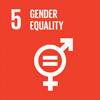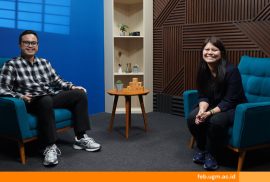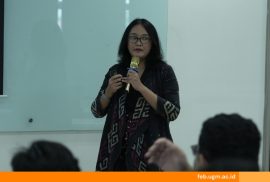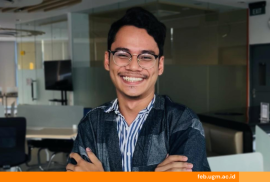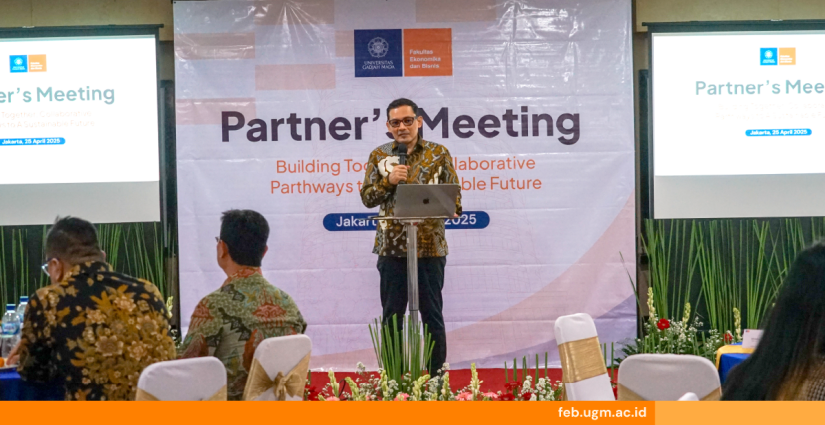
The Faculty of Economics and Business Universitas Gadjah Mada (FEB UGM) successfully organized a Partners’ Meeting with the theme “Building Together: Collaborative Pathways to a Sustainable Future” on Friday (April 25, 2025) at the Auditorium Room, 9th Floor, MM FEB UGM Building in Jakarta. FEB UGM leadership, university representatives, and strategic partners from diverse sectors—including industry, government, banking, NGOs, and international organizations—attended the event.
The Partners Meeting served as a platform to strengthen partnerships, explore new collaborations in education, research, and community service, and design synergistic programs that contribute to achieving the Sustainable Development Goals (SDGs). This meeting also allowed FEB UGM to gather feedback from its partners. The event also introduced the Research and Development for Societal Impact (RDSI) unit, established in 2025 as a transformation of the Economics and Business Research and Training Center (P2EB), which had operated since 2010.
On this occasion, Muhammad Edhie Purnawan, Ph.D., Member of the OJK Supervisory Board, delivered a keynote speech titled “The Role of Financial Services in Indonesia’s Economic Growth and the Potential for Industry-Academia Collaboration.” In his presentation, Edhie stated that the financial services sector has proven to be a main pillar of Indonesia’s economic growth through its maintaining macroeconomic stability, channeling productive capital, expanding financial inclusion, and supporting sustainability agendas. Achievements such as 10.39% credit growth, 85% financial inclusion rate, and IDR 50 trillion in green bond issuance in 2024 reflect the sector’s resilience and dynamism. However, challenges such as unequal access, financial literacy gaps, cyber risks, and global uncertainty demand more intensive innovation and collaboration.
Edhie highlighted the potential for collaboration between the industry and academia. Partnerships between FEB UGM and industry players such as banks, state-owned enterprises (SOEs), Big Four auditors, and FMCG companies are key to addressing challenges and maximizing the potential of the financial services sector. With the Research Development for Societal Impact (RDSI), FEB UGM can lead such partnerships. Collaborative research, for instance, can yield solutions such as AI-based risk models, blockchain technologies, and green financing frameworks. Additionally, FEB UGM can enhance human resource development by designing curricula relevant to the needs of banks, SOEs, and FMCG industries.
Moreover, collaboration can expand financial literacy through community service programs and support evidence-based policy making by providing analysis to aid the OJK and the Ministry of Finance.
He also recommended several concrete steps for future collaboration between FEB UGM and industry partners. These include initiating a sustainable finance collaboration forum, promoting joint-funded collaborative research between universities and industry, establishing an FEB UGM Financial Innovation Center as a fintech startup incubator, and developing the FEB UGM Financial Academy as a training platform for students, professionals, and micro, small, and medium enterprises (MSMEs),” he explained.
“The financial services sector is the driving engine of Indonesia’s economy, but its full potential depends on cross-sector collaboration. With the presence of Prof. Didi Achjari and the leadership of FEB UGM, along with strategic partners from banking, SOEs, Big 4, and FMCG industries, we have a strong foundation to build an inclusive and sustainable future. FEB UGM, through RDSI and its innovative programs, is ready to lead this transformation,” he concluded.
Dean of FEB UGM, Prof. Dr. Didi Achjari, M.Com., Ak. CA. Outlined several strategic initiatives of FEB UGM to support the achievement of the SDGs. These initiatives have been developed primarily to address global challenges such as climate change and rising unemployment due to the artificial intelligence revolution.
“We are committed to innovating the curriculum, including integrating sustainability issues and data analytics,” he explained.
Didi said FEB UGM is also promoting the digitization of education through platforms such as MOOC, Sidek-Edu, and Sidek-ERP. It also emphasizes collaborative research as the basis for creating evidence-based policies.
Meanwhile, Prof. Drs. Gugup Kismono, M.B.A., Ph.D., further introduced the Research and Development for Societal Impact (RDSI) unit of FEB UGM, highlighting the faculty’s commitment to delivering relevant and impactful intellectual contributions to society, business, and industry.
“FEB UGM is committed to delivering intellectual contributions that are relevant, strategic, and have a real impact on society, business, and industry. RDSI provides comprehensive services ranging from research and studies to institutional capacity building and human capital development, as well as technical assistance and consulting in accounting, economics, and management,” Gugup added.
RDSI also organizes TOEFL tests and tax certification programs. In addition, RDSI offers a range of programs based on client needs for various institutions, both private and public sectors, government agencies, and international organizations.
Meanwhile, the Head of the University Quality Assurance and Reputation Unit (SPMRU) at UGM, Prof. Dr. Indra Wijaya Kusuma, M.B.A., emphasized the importance of strengthening global reputation, which must be achieved through concrete achievements such as international accreditation by highly respected institutions and performance in global rankings.
“FEB UGM continues to strive to enhance its academic reputation by strengthening basic research that generates new knowledge, applied research that addresses real-world problems, and teaching innovations, including the development of Massive Open Online Courses (MOOCs) and AI-based technology,” he explained.
Indra added that alumni contributions are an essential pillar of reputation building, as they have a tangible impact on society. In addition, FEB UGM builds its reputation through strategic collaborations with industry, including research partnerships, internship programs, and consulting services.
This Partners Meeting serves as a pivotal moment to strengthen the collaborative role of stakeholders in creating a sustainable future. Through the active participation of its partners, FEB UGM hopes to build a synergistic network that positively impacts society and the world.
Report by: Shofi Hawa Anjani
Editor: Kurnia Ekaptiningrum
Sustainable Development Goals


